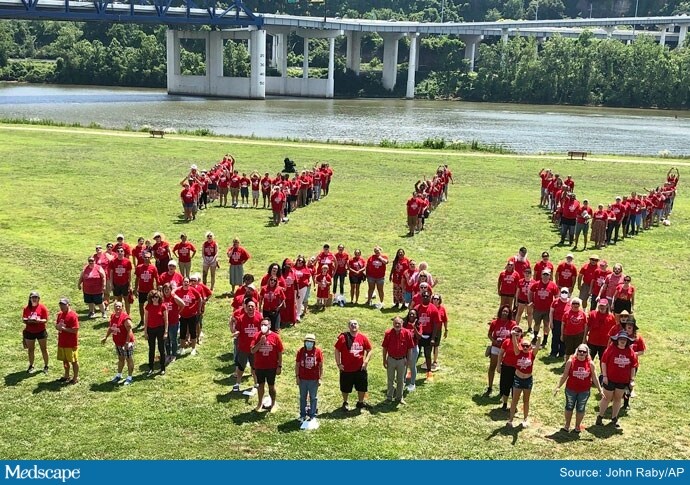
Dozens of people form the phrase “HIV SOS” in Charleston, W.Va. Activists are calling on the city of Charleston to declare a public health emergency for new HIV cases and prescription drug overdoses.
CHARLESTON, W.Va. (AP) — Dozens of volunteers formed the letters “HIV SOS” at a health event Saturday as activists seek a public health emergency declaration in a city with one of the nation’s highest spikes of such cases.
Kanawha County, which includes Charleston and has 178,000 residents, had two intravenous drug-related HIV cases in 2018. The number grew to 15 in 2019 and 39 last year, according to state data. There have been 14 such cases so far in 2021.
After volunteers wearing red T-shirts formed the plea for help along the Kanawha River near downtown Charleston, Joe Solomon, co-founder of the nonprofit group Solutions Oriented Addiction Response, called on the City Council and Mayor Amy Shuler Goodwin to act on the HIV crisis and overdoses from prescription pain pills.
“In Charleston and Kanawha County, there’s a family butchered by the overdose crisis every other day,” Solomon said. “All we’re asking is for (them) to take one day to declare a public health emergency. We need to treat this like the emergency that it is.”
Earlier this year, Dr. Demetre Daskalakis, the CDC’s chief of HIV prevention at the Centers for Disease Control and Prevention, called Kanawha County’s outbreak “the most concerning in the United States.” He warned it could take years to address the surge and that the case count possibly “represents the tip of the iceberg.”
Earlier this week the CDC presented preliminary findings of an investigatio n that showed emergency departments and inpatient medical personnel in Kanawha County rarely conducted HIV testing on intravenous drug users.
Republican Gov. Jim Justice in April signed a bill to introduce more stringent requirements to needle exchange programs like those offered by Solomon’s group. The move came over the objections of critics who said it would restrict access to clean needles amid the spike in HIV cases.
The bill requires licenses for syringe collection and distribution programs. Operators would have to offer an array of health outreach services, including overdose prevention education and substance abuse treatment program referrals. Participants also must show an identification card to get a syringe.
Advocates view the regulations as onerous.
The American Civil Liberties Union on Friday filed a lawsuit challenging the new law.
Source: Read Full Article